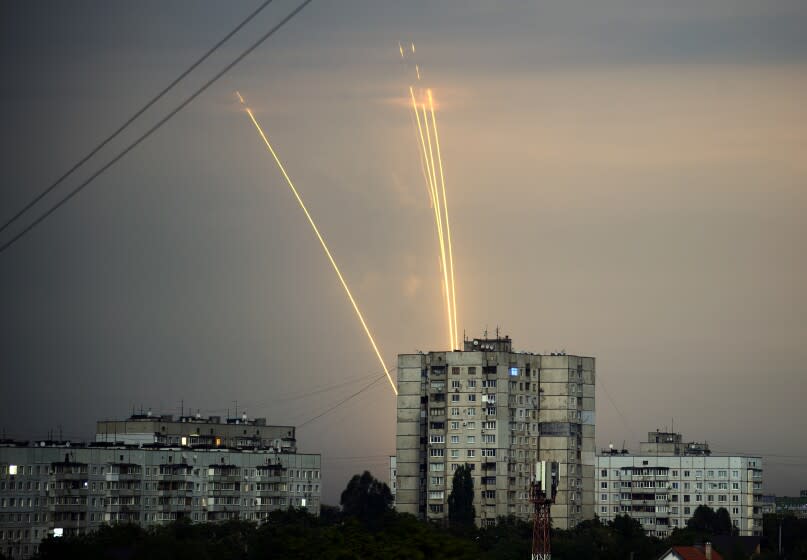Ukrainian military says it repelled more than a dozen attacks

- Oops!Something went wrong.Please try again later.
The Ukrainian military said Monday that it had repelled more than a dozen Russian attacks in the country’s east and north, including attempts to advance on key cities in the eastern industrial heartland known as the Donbas.
In its regular Facebook update, the military's general staff said Russian troops had attempted to push toward Kramatorsk, one of two major cities in the eastern Donetsk province that remain under Ukrainian control, but “they failed completely and chaotically retreated to their previous positions.”
In the same post, the military said Russian forces had staged an unsuccessful assault on Bakhmut, a strategic town in the Donetsk region whose capture would pave the way for Russia to take Kramatorsk and the de facto Ukrainian administrative capital, Slovyansk.
The Donetsk region is one of two provinces that make up the Donbas, where the fighting has largely been focused in recent months, since Kremlin forces retreated from around the capital, Kyiv.
Russian officials announced the full capture of the Luhansk region, the second of the two, early last month, though its Ukrainian governor has repeatedly claimed that Kyiv’s forces are holding out in a small area near the regional boundary.
In the same update, the military claimed that Russia had tried and failed to break through Ukrainian defense lines in the northern Kharkiv region, home to Ukraine’s second-largest city, but were “met harshly and thrown back.”
Meanwhile, the Russian FSB, the KGB’s main successor agency, said that it had thwarted a “sabotage and terrorist attack” on an oil pipeline in Russia’s southern Volgograd region, which it blamed on two Russian citizens colluding with Ukrainian security forces.
The claims could not be immediately verified.
Elsewhere, Russian and Ukrainian officials traded more accusations Monday about renewed shelling of the Zaporizhzhia nuclear power plant, with each side alleging that the other was responsible for the attacks that have raised fears of a catastrophe.
The press office of the Kremlin-backed administration in Enerhodar, the Russian-controlled city where the plant is located, told the Interfax agency that Ukrainian forces were carrying out “massive shelling” of the facility, as well as Enerhodar’s residential and industrial areas.
According to the statement, the shelling came from nearby Nikopol, a Ukrainian-held city which faces the plant across the Dnieper River.
The mayor of Nikopol later said Russians were shelling Enerhodar themselves.
Mayor Yevhen Yevtushenko and other municipal authorities in Nikopol have repeatedly accused Russian troops stationed at the plant of shelling the city, knowing that Ukrainian forces there were unlikely to fire back.
Ukrainian President Volodymyr Zelensky renewed his call for fresh sanctions against Moscow and its nuclear industry in response to the situation. He described Russian forces’ actions there as “nuclear blackmail” that may embolden malign actors worldwide.
As Russian forces kept up their artillery barrages around Ukraine, at least three Ukrainian civilians were killed and 20 others wounded, Ukrainian officials said.
The deaths and the wounding of 13 of the victims were blamed on Russian shelling that hit towns and villages in the Donetsk region, officials said.
In Kharkiv, seven civilians were wounded by Russian shelling that hit residential buildings and an area near a bus stop. Kharkiv Gov. Oleh Sinegubov said the wounded included an 80-year-old woman.
Russian Defense Ministry spokesman Igor Konashenkov said Monday that Russian warplanes struck Ukrainian army positions in the southern Kherson region and in the Donetsk region. He added that the Russian air force also hit a facility in the Kharkiv region, killing at least 100 and wounding 50 “mercenaries” from Poland and Germany. His claims could not be independently verified.
Speaking at the opening of an arms show outside Moscow, Russian President Vladimir Putin hailed the military's action in Ukraine, declaring that it “fights for Russia ... and fulfilling all the tasks that were set, liberating the Donbas step by step.” He also vowed to expand arms sales to Russian allies, whom he praised for continuing to offer firm support to Moscow in the face of Western pressure.
For their part, the Ukrainian military claimed to have destroyed more than 10 Russian warehouses with ammunition and military equipment in the last week.
To continue fighting the invasion, the Ukrainian parliament extended martial law and the country's general mobilization for an additional 90 days.
“Ukraine has always longed and longs for peace and many times in various negotiation formats has offered the Russian leadership to end the war and free Ukrainian land from occupation,” Zelensky said in a video late Sunday. “But so far, Russia believes in terror, remains in the grip of its propaganda illusions and still hopes that it can supposedly achieve something through various forms of blackmail. It won’t.”
He emphasized that “we must defend ourselves,” adding that “the stronger Ukraine will be, the weaker Russia will be, and therefore, the less time this war will last.”
Meanwhile, Zelensky dismissed the heads of three regional branches of Ukraine’s top security agency, the SBU, in the Kyiv, Lviv and Tarnopil regions. Zelensky’s office didn’t elaborate on the reasons behind the move. Last month, he dismissed SBU chief Ivan Bakanov and a chief prosecutor, saying their departments had too many people who faced accusations of collaborating with the Russians.
Speaking in an interview with Singapore's CNA television, Ukrainian First Lady Olena Zelenska said that “no one in the world can take a neutral stand in that war,” adding that “you can either be on the aggressor’s side or the one who has come under attack — there is no other choice.”
“People in other countries should know — it’s not Ukraine to blame for soaring prices, it’s the aggressor who started the war,” she said.
This story originally appeared in Los Angeles Times.

